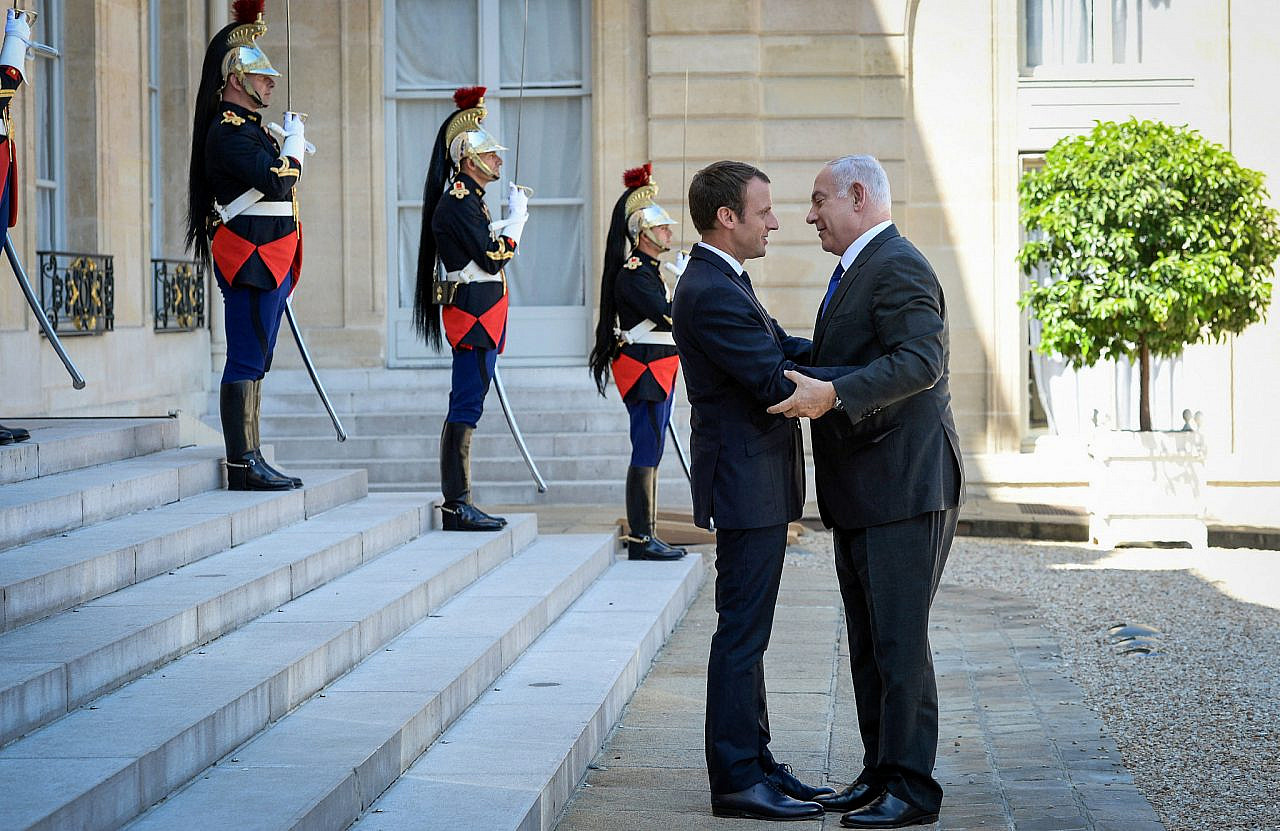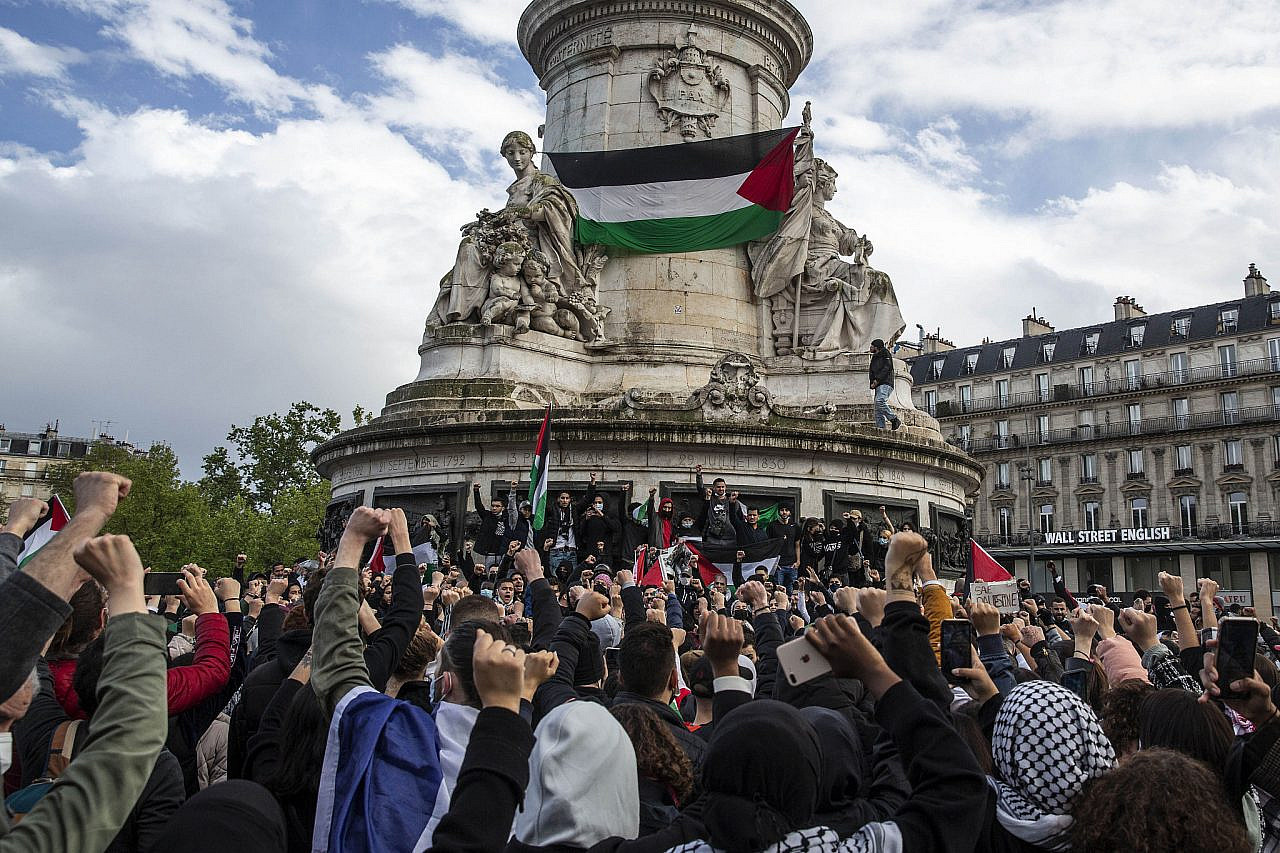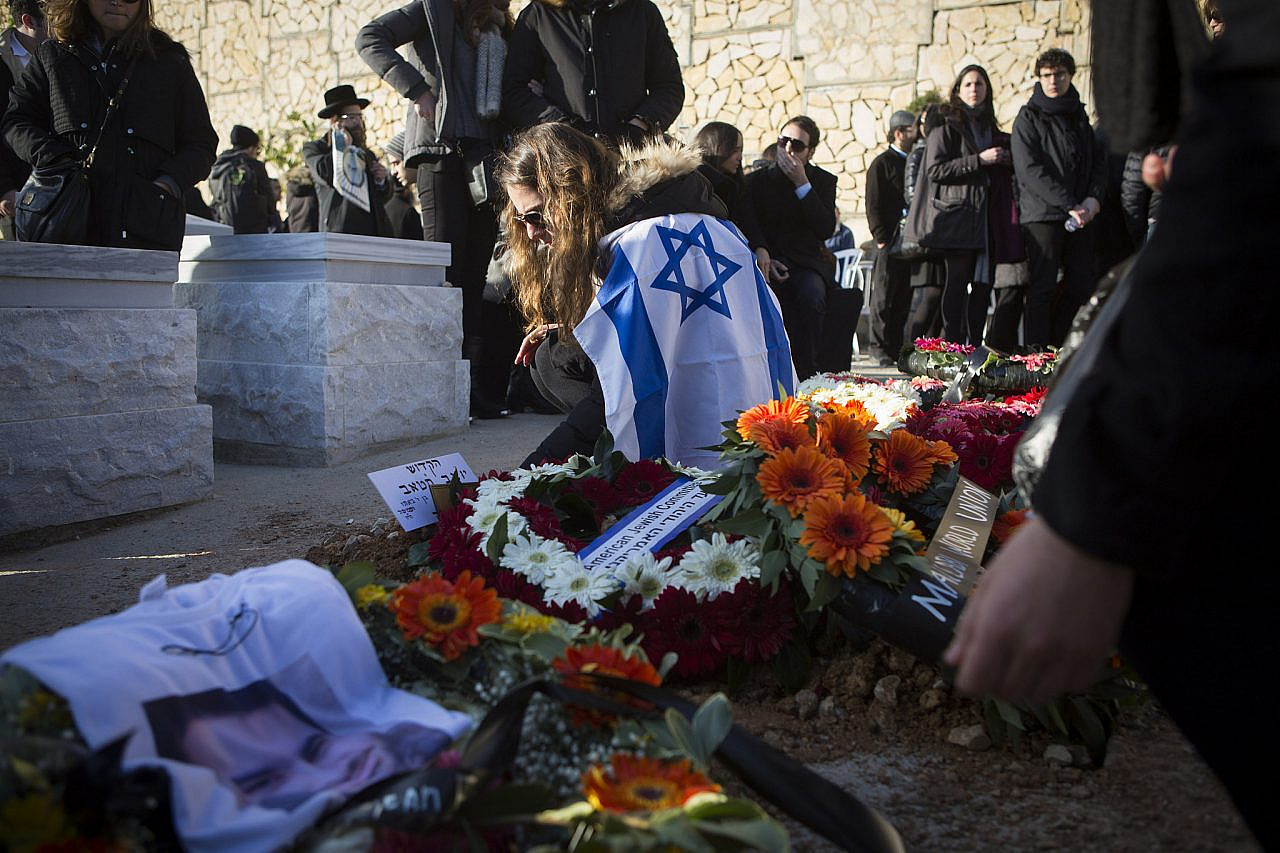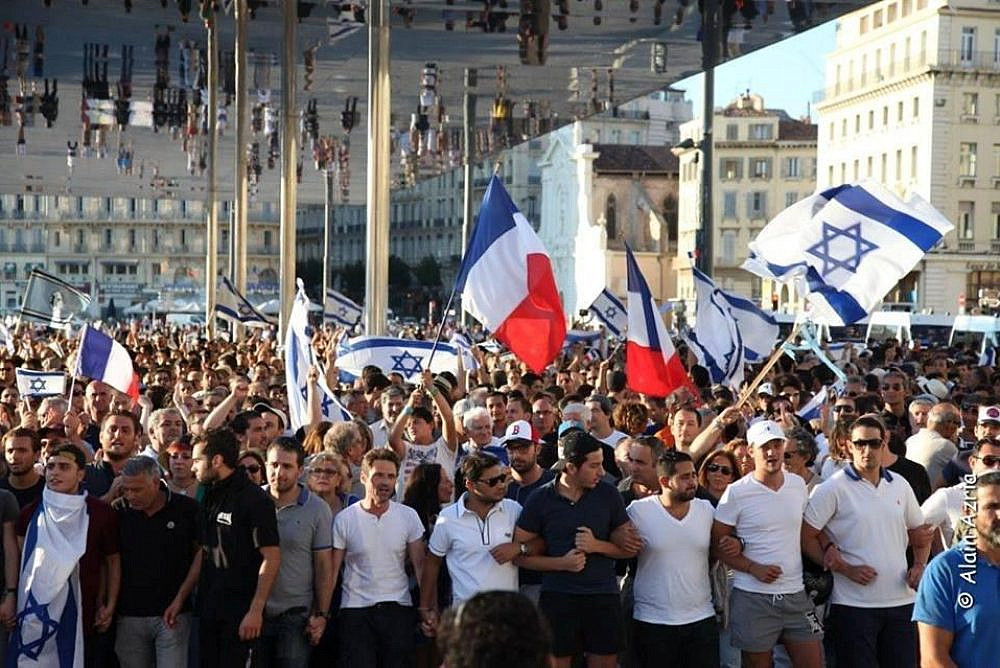In France’s Jewish community, the third largest in the world, you won’t find many people questioning Israel’s violence against Palestinians. Doing so, like questioning Zionism in general, is seen as either an act of antisemitism in and of itself, or a dangerous distraction from dealing with the antisemitism present in the country.
While it might be intuitive to assume that bigger Jewish populations produce a wider diversity of positions on Israel-Palestine, criticism of Israel is almost entirely absent from the French-Jewish conversation. In contrast to the significant pockets of left-leaning American, Israeli, and British Jews who publicly criticize Israeli occupation and apartheid, and reject the narrative that Jewish safety in Israel and the diaspora relies on Palestinian oppression, these pockets are few and far between in France.
This relative silence has its roots in a complex array of factors: the ways in which Jewish communal life in the country is organized; the tensions dividing French-Jewish left-wing activists; and the manifestations of antisemitism in France today. Together, these dynamics have forestalled the emergence of a French equivalent of groups such as IfNotNow and Na’amod in the United States and U.K., respectively, while also denying a public space in which to claim a Jewish identity where the fight against antisemitism is seen as intertwined with the struggle for Palestinian liberation.
This stifling of left-wing, anti-occupation Jewish activism in France perpetuates the narrative that the safety of French Jews is predicated on Israel’s security, while the intensive association of criticism of Israel with antisemitism is muddying the waters in the face of real incidents of anti-Jewish violence in France. Taken together, these trends are undermining both Jewish safety and Palestinian liberation.
A communal monopoly
Jewish life in France is governed primarily by one centralized institution: the Representative Council of French Jewish Institutions (CRIF). The CRIF seeks to provide a unified political voice on behalf of France’s Jews by advancing ties with high-level political actors and developing a strong media presence. To this end, the CRIF hosts an annual dinner at which France’s head of state is invited to speak and show support for the French Jewish community. As a result, the CRIF has come to be seen as the state’s primary interlocutor on matters of Jewish concern.
Founded in 1944 in occupied France, the CRIF emerged as a clandestine organization representing both French and foreign Jews, and worked to advance the constitutional protection of Jewish life and reparations for Jews in post-war France. Despite disagreements among its early members, the Council initially included a diversity of political affiliations (including communists, Bundists, and Zionists) and views on Israel. Moreover, in the aftermath of WWII, French Jews continued to feel a sense of belonging to the French nation and, in line with French ideals of cultural assimilation, largely identified with the French Republic more so than with the newly established state of Israel — a status quo reflected in the CRIF’s focus on domestic issues.
However, the organization’s outlook and central mission changed significantly in the wake of the 1967 Six-Day War, as the sociologist Samuel Ghiles-Meilhac noted in his study, “The CRIF: From the Jewish Resistance to the Lobby Temptation, from 1943 to Today.” The perceived threat of Israel’s destruction, and its subsequent victory, transformed French-Jewish sensibilities, and, in response, the CRIF pivoted more exclusively toward unconditional support for Israel. This shift was cemented in the CRIF’s 1977 charter, which establishes a clear link between French Jews and Israel and calls upon the French state to develop a strong Franco-Israeli alliance in order to defend Israel against Arab states.

According to Ghiles-Meilhac, the arrival of over 230,000 North African Jews to France after the decolonization of Tunisia and Morocco in 1956, and Algeria in 1962, also contributed to the CRIF’s expansion, as Sephardic Jewish organizations were incorporated into the Council. Immigration of Jews from North Africa doubled France’s Jewish population, making it the largest in Europe.
Since the 1980s, the CRIF has had a monopoly on French Jewish communal life. Today, it simultaneously acts as the primary organizer of Jewish life in France, a pro-Israel lobby, and the communal voice of French Jews. Unlike in the United States, for example, where there exists the pro-Israel lobby group AIPAC on the one hand, and the Conference of Presidents of Major American Jewish Organizations, which represents a (relative) diversity of Jewish organizations, on the other, the CRIF merges these two functions. In this role, it has framed “solidarity with Israel” as an issue pertaining to French-Jewish safety rather than foreign policy.
According to journalist Sylvain Cypel, author of “The State of Israel Against the Jews,” the commingled organizational missions of Jewish institutions are a key reason why French Jews do not speak out publicly against the occupation today. “We need to develop a Jewish communal life that is independent from Israeli interests,” Cypel told +972 Magazine. As it stands, he stressed, the CRIF and its leaders perceive any critique of Israel by members of the Jewish community as an invitation to legitimize antisemitism, creating an official pro-Israel rhetoric that prevents the flourishing of a truly plural Judaism — and diverse communal political representation — in France.
The French political elite fully backs the CRIF. At the organization’s annual dinner in 2019, French President Emmanuel Macron endorsed the council’s official narrative, stating that “anti-Zionism is one of the modern forms of antisemitism.” That same year, the French national assembly voted to approve the International Holocaust Remembrance Alliance (IHRA) definition of antisemitism, which, among other things, equates anti-Zionism with antisemitism. The CRIF supported and encouraged this resolution, including through its #VoteIHRA virtual campaign.
In opposition to this stance, 127 Jewish intellectuals, primarily from Israel, the United States, and the U.K., published an open letter in France’s leading news outlet Le Monde, calling on French members of parliament to reject the IHRA definition. Only 12 of the letter’s signatories were French.
Divisions on the French-Jewish left
The Jewish left in France is itself divided on whether to engage with Israel-Palestine at all. While a few new left-leaning, anti-racist, and youth-led Jewish groups have emerged since 2015 — such as the Juif et Juives Révolutionnaires (Revolutionary Jews — JJR) and Juifves VNR (Angry Jews) — their priority is to fight against discrimination and prejudice at home, sometimes alongside other minority groups, in a collective struggle against antisemitism, Islamophobia, sexism, and racism. These groups argue it is antisemitic to confront Jewish organizations with questions pertaining to Israel-Palestine, with the rationale that French Jews, including anti-racist Jewish collectives, should not be required to speak about or on behalf of Israel (which is, in contrast, a core aspect of the CRIF’s mission).
The Union Juive Française pour la Paix (the French Jewish Union for Peace — UJFP) is the only Jewish-led anti-occupation group in France. Created in 1994, it is a minor presence in the French-Jewish cultural and political sphere, shunned by the organized Jewish community and publicly critiqued by other left-wing French Jewish organizations, including for its public support of BDS.

The group, which includes about 30 active members, works simultaneously on issues relating to Israel-Palestine and domestic anti-racism. It calls for Israel’s retreat from the territories occupied since 1967 and an end to the apartheid system, and advocates for the Palestinian right of return, including through the publication of online statements and alliance building with Palestinian solidarity and anti-Islamophobia groups. Unlike IfNotNow and Na’amod, which were predominantly established by young Jews, the vast majority of the UJFP’s members are retired, and the organization rarely engages in stand-alone direct action work.
“It is very complicated in France today to both participate in organized Jewish life and hold anti-Zionist positions, let alone express them publicly,” Simon Assoun, a member of the UJFP’s national coordinating committee, told +972. High-profile antisemitic attacks in France since the early 2000s have left young French Jews “scarred,” Assoun continued, and feeling that “the radical left has [not] been taking this issue seriously. This is also tied to the ideological work of the CRIF and pro-Israel forces among the organized Jewish community in France, which have created a rift between the Jewish community and the left,” Assoun added.
On the other hand, although the JJR describe themselves as anti-colonial and revolutionary, they do not actively engage on issues relating to Israel’s colonialism. The group made an exception in May 2021, when it issued a statement condemning the violent repression of Palestinians and encouraging French Jews to critically evaluate their unconditional support for the Israeli government. However, the text primarily stressed the antisemitism directed toward French Jews as a result of the situation in Israel-Palestine, stating: “For us, the solution to this antisemitism is neither assimilation, nor Zionism, but the struggle here and now, in the diaspora.”
In an interview they gave to the socialist outlet Revue Ballast in 2019, the JJR explained that while they do not necessarily oppose the UJFP’s critique of Israeli colonialism, they are deeply critical of the group’s approach toward battling antisemitism in France. The JJR accused the UJFP of analyzing antisemitism in France exclusively through the prism of Zionism, and of presenting themselves as the “good Jews” with whom the radical left can collaborate in an attempt to silence the antisemitism seen as circulating within its ranks.
This perception of left-wing antisemitism comes, moreover, amid a succession of antisemitic incidents in France since the early 2000s that have created a growing sense of insecurity, shaping French Jews’ sense of self and their relationship to both France and Israel. These include the murders of individuals targeted for being Jewish (Ilan Halimi, Sarah Halimi, Mireille Knoll, among others); attacks against Jewish establishments (such as the 2012 shooting in Toulouse that killed seven people including three children at a Jewish school, and the attacks at a Paris kosher supermarket in 2015 in which four Jews were killed); and the normalization of antisemitic tropes and imagery (most recently, a fresco in the town of Avignon).
French Jews are significantly impacted by these antisemitic incidents and by an intractable atmosphere of fear. According to a 2018 survey by the European Union Agency for Fundamental Rights on experiences and perceptions of antisemitism, Jews in France are more worried of being the victim of a hate crime than Jews in other European countries (roughly 70 percent of respondents worried that family members or close friends would be the victims of verbal insults, harassment, and physical attacks).

However, Jews in other European countries report higher rates of family members and friends being attacked (20 percent of respondents in France versus, for instance, 28 percent in Belgium), or of witnessing an attack themselves (for example, 22 percent of respondents in France versus 32 percent in Poland). This perception gap speaks to the contemporary framework of fear among French Jews, which has in turn contributed to both the French-Jewish establishment’s unconditional support for Israel, as well as leftist Jewish activists’ desire to steer clear of discussing Israel-Palestine.
Pitting French-Jewish safety against Palestinian liberation
Some of these tensions are crystallized in a 2018 guide, “Let’s be clear on antisemitism,” written by the Collectif Seum, a group of Black, Muslim, Jewish, and Arab women. The text, which was shared widely on social media by leftist Jewish and other anti-racist organizations, comprises a list of 45 points that seek to explain the various ways in which antisemitism manifests within anti-racism movements in France. In so doing, the list ends up framing Palestinian solidarity and the struggle against antisemitism as incompatible.
While the text acknowledges the occupation and the persecution of Palestinians, and does not condemn Palestinian solidarity work, it – perhaps inadvertently – calls for such work to be highly regulated in order to exclusively protect Jewish well-being. This list, and its acclaimed afterlife on social media, highlight how challenging it is in France to simultaneously stand up against antisemitism and for Palestinian rights, given these two are so often presented as antagonistic political projects — even among the Jewish left.
French Jewish silence around Israeli occupation and apartheid is thus enmeshed in a constellation of factors: the CRIF’s adamantly pro-Israel stance, the French government’s endorsement of this stance, and the subsequent reductive nature of the French-Jewish institutional community; fundamental disagreements among the Jewish left between anti-Zionists, Zionist leftists, and those wishing to avoid any discussion on Israel-Palestine; and the spate of high-profile antisemitic attacks across France, which have shaped both a deep atmosphere of fear among French Jews, and a desire to prioritize the struggle against antisemitism domestically as well as to legitimate the fight against perceived Arab and Palestinian enemies.
Jewish institutional actors, official state discourse, and segments of the Jewish left all reproduce the narrative according to which French-Jewish safety and Palestinian liberation are fundamentally incompatible, undergirded by the idea that the very safety of Jews in France is predicated on Israel’s security. According to this dominant mentality, naming and criticizing Israeli occupation and apartheid risks jeopardizing French Jews in a country whose political leadership still seeks forgiveness for its role in the Holocaust, and where institutional discourse shuts down any avenue for a simultaneous struggle for Jewish safety and Palestinian liberation.

